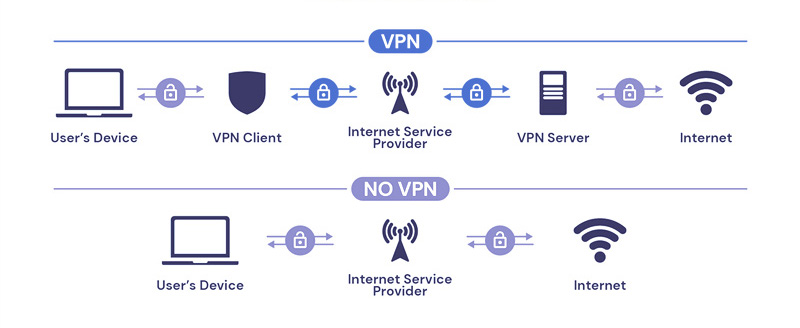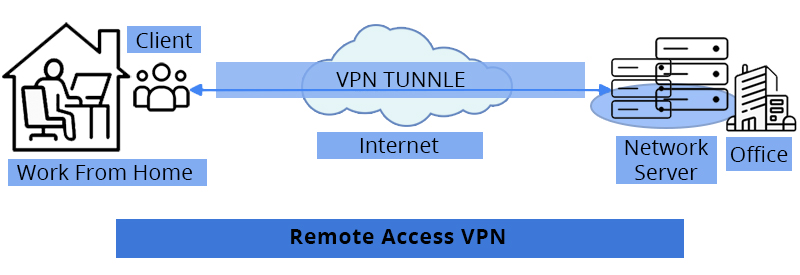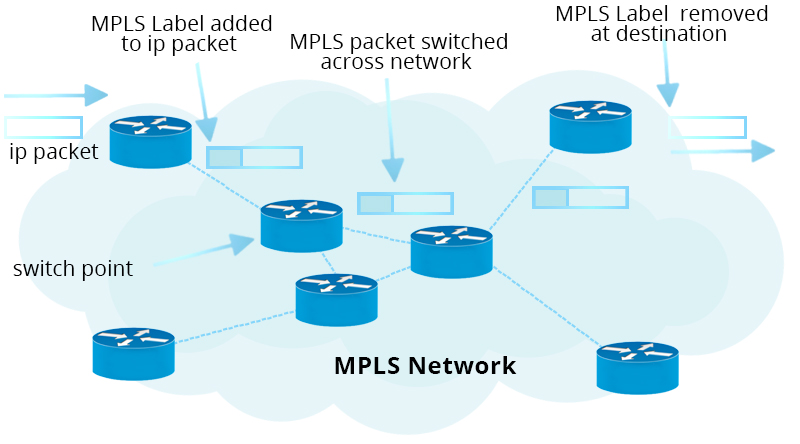MPLS and VPN, What is the Difference?
Virtual Private Networks (VPNs) and Multi-Protocol Label Switching (MPLS) are emerging as competing technologies for efficiently storing and securing data. This article delves into their definitions, explores their pros and cons, and examines critical differences. By examining factors such as speed, flexibility, cost, and security, we aim to provide decision-makers with a concise guide to facilitate an informed choice between MPLS and VPN technologies for network connectivity.
What is Virtual Private Network (VPN)?
VPN Definition
A VPN, short for Virtual Private Network, is a network communications technology. It allows a private network to be established over a public network. A VPN is like building a "private channel" over a public network, allowing you to transmit data securely within that channel. When you use a VPN, your network traffic is encrypted and forwarded through a VPN server, which protects your privacy and security by hiding your real IP address and network activity.

Advantages of VPN (Virtual Private Networks)
Easy Setup and Configuration:
With a simple configuration process, VPNs eliminate the need for extensive technical expertise, enabling small businesses to integrate secure network connections efficiently and cost-effectively. VPN also makes it easy for individual users to establish secure remote access connections.
Cost Efficiency:
One of the most notable benefits of Virtual Private Networks (VPNs) is their cost-effectiveness. Because they rely on existing Internet connections, they are generally more budget-friendly than alternatives such as Multiprotocol Label Switching (MPLS).
Flexibility:
Virtual Private Networks (VPNs) are remarkably flexible, adapting seamlessly to a wide range of devices and operating systems. Whether accessed through laptops, smartphones, or different operating systems, VPNs' versatility gives users the freedom to connect securely and reliably.
Scalability:
Scalability allows organizations to expand their network efficiently. VPNs can seamlessly grow to accommodate large numbers of users. This scalability ensures adaptability to evolving business needs and provides a cost-effective solution for growing organizations.
Remote Access:
Using a VPN for remote access allows users to connect to the internal network anywhere. This technology enables remote office work or mobile work.

Disadvantages of VPN Connection
Security Risks:
One notable disadvantage of Virtual Private Networks (VPNs) arises from potential security risks when not configured adequately. Inadequate setup may expose data and networks to the threat of hackers, emphasizing the critical need for meticulous implementation and ongoing security measures.
Reduced Reliability:
VPNs may exhibit lower reliability than Multiprotocol Label Switching (MPLS) due to their dependence on the public internet. The reliance on public networks makes VPNs susceptible to outages and other connectivity issues, impacting the consistency of service delivery.
Diminished Performance:
Another drawback associated with VPNs is the potential for lower performance compared to MPLS. MPLS networks typically rely on a single service provider's infrastructure, creating a single point of failure. If the provider experiences downtime or encounters technical issues, it can disrupt the entire network, leading to service interruptions for connected organizations.
What is Multi-Protocol Label Switching (MPLS)?
MPLS Meaning
MPLS stands for Multi-Protocol Label Switching. It is a standardized protocol used in telecommunications and computer networks to efficiently direct data packets along a network's communication path. In MPLS, each data packet is assigned a label, a short, fixed-length identifier. These labels make forwarding decisions as the packet travels through the network. MPLS helps achieve faster and more reliable communication by optimizing the routing process and providing greater control over network traffic.

Advantages of MPLS Connection
Enhanced Security:
MPLS provides enhanced security in contrast to conventional VPNs by operating independently of the susceptibilities linked to the public Internet. MPLS ensures a more robust and secure communications environment by leveraging dedicated connections and avoiding exposure to common Internet threats.
High Reliability:
MPLS ensures high reliability and quality of service by using dedicated connections rather than relying on the public Internet. This feature ensures a more robust and reliable network, reducing the risk of downtime and improving service.
High Performance:
MPLS delivers high performance and minimal latency by using dedicated connections, eliminating the need for extensive encryption and decryption. The streamlined approach of MPLS contributes to efficient data transmission, ensuring fast and responsive network operations.
Disadvantages of MPLS Technology
Higher Cost:
MPLS tends to be more expensive than VPNs, primarily due to the need for dedicated connections.
Limited Flexibility:
MPLS exhibits less flexibility when compared to VPN solutions. The rigid nature of MPLS may necessitate the use of specialized software or hardware.
Longer Implementation Period:
Building and deploying MPLS circuits is a slow process. Enterprises using MPLS may find it difficult to respond quickly to sudden spikes in bandwidth demand due to the time-consuming nature of MPLS configuration and deployment.
MPLS vs VPN, What are the Differences?
Speed Differences Between MPLS and VPN
MPLS leads the way with its impressive data transfer speeds. This design makes MPLS particularly well-suited for applications that require fast, low-latency data transfers, positioning it as a favorable choice for scenarios that require real-time responsiveness.
On the other hand, VPNs, especially those based on the Internet Protocol, introduce a variable element to data transfer speeds. Affected by network congestion and Internet bandwidth, VPNs can provide secure connectivity, but experience fluctuations that can affect the performance of latency-sensitive applications.
Flexibility of MPLS vs. VPN
MPLS is typically used to enhance the security of enterprise internal networks, requiring configuration for each connection. Therefore, extending MPLS would be inflexible. On the other hand, VPN offers greater adaptability, making it ideal for organizations with evolving connectivity needs or those seeking more agile networking solutions.
VPN versus MPLS Cost Analysis
MPLS networks, known for their dedicated and private infrastructure, typically have higher initial setup and maintenance costs. Conversely, VPNs offer a more cost-effective alternative, especially those that use public Internet connections. This makes VPNs particularly attractive to small and medium-sized businesses looking for budget-friendly networking solutions.
Security Levels of MPLS vs. VPN
MPLS networks have a distinct advantage over traditional VPNs because they limit the ability to intercept traffic, preventing hackers from deciphering key IP addresses within data packets. This restriction effectively limits their access to valuable details about the source and destination of the data. Strengthened by robust encryption protocols across a wide range of network activities, MPLS contributes to a robust network security framework. The increased level of confidentiality in MPLS hides locations, making it more difficult for intruders to penetrate critical data and systems. While MPLS is widely recognized for providing enhanced security over VPNs, it is not foolproof. Hackers can exploit vulnerabilities in the infrastructure or protocols, underscoring the need for organizations to maintain updated systems with the latest patches to strengthen defenses against potential threats.
The table below outlines the key distinctions between MPLS and VPN.
MPLS or VPN, How to Choose?
The choice between MPLS and VPN depends on your specific network needs and priorities. Multiprotocol Label Switching (MPLS) is a reliable choice for large enterprises. It provides dedicated and predictable paths for data transmission, making it ideal for applications with stringent latency and reliability requirements. If you decide to get a switch that supports MPLS, you can choose the QSFPTEK 2.5GbE network switches, all of which meet your needs!
On the other hand, Virtual Private Networks (VPNs) are a cost-effective solution for businesses that value flexibility and scalability. VPNs operate over the public Internet and are a more affordable alternative to MPLS. They work well for organizations with remote or distributed teams, providing secure connectivity without the need for dedicated infrastructure.
Ultimately, the choice between MPLS and VPN depends on factors such as budget constraints, performance requirements, and the geographic distribution of your workforce. Evaluating your specific needs and considering the tradeoffs between these technologies will help you make an informed decision about your network infrastructure.
Conclusion
In summary, VPN and MPLS stand out as prominent methods for securing data transmitted online. Virtual Private Networks offer flexibility and cost efficiency but may face security risks. Multi-Protocol Label Switching excels in security, reliability, and performance, making it ideal for large enterprises. However, its higher cost and longer implementation period may pose challenges. The choice depends on your specific needs. For further information on distinguishing between VPN and MPLS, don't hesitate to contact us via email at [email protected].










